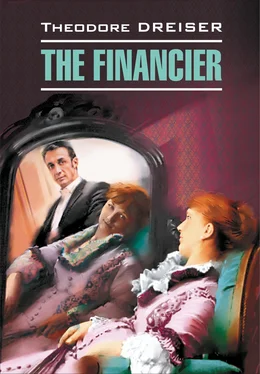Neither Strobik, Harmon, nor Wycroft knew how the certificates of city loan, which were worth only ninety on the open market, were to be made to sell for one hundred on ’change, but Mollenhauer’s secretary, one Abner Sengstack, had suggested to Strobik that, since Butler was dealing with young Cowperwood and Mollenhauer did not care particularly for his private broker in this instance, it might be as well to try Cowperwood.
So it was that Cowperwood was called to Stener’s office [102] So it was that Cowperwood was called to Stener ’ s office . – Вот как получилось, что Каупервуд был приглашен в офис Стинера.
. And once there, and not as yet recognizing either the hand of Mollenhauer or Simpson in this, merely looked at the peculiarly shambling, heavy-cheeked, middle-class man before him without either interest or sympathy, realizing at once that he had a financial baby to deal with. If he could act as adviser to this man – be his sole counsel for four years! <���…>
“I tell you what I’d like to do, Mr. Stener,” he said, after he had listened to his explanation and asked how much of the city loan he would like to sell during the coming year. “I’ll be glad to undertake it. But I’d like to have a day or two in which to think it over.”
“Why, certainly, certainly, Mr. Cowperwood,” replied Stener, genially. “That’s all right. Take your time. If you know how it can be done, just show me when you’re ready. By the way, what do you charge?”
“Well, the stock exchange has a regular scale of charges which we brokers are compelled to observe. It’s one-fourth of one per cent. on the par value of bonds and loans. Of course, I may have to add a lot of fictitious selling – I’ll explain that to you later – but I won’t charge you anything for that so long as it is a secret between us. I’ll give you the best service I can, Mr. Stener. You can depend on that. Let me have a day or two to think it over, though.”
He shook hands with Stener, and they parted. Cowperwood was satisfied that he was on the verge of a significant combination, and Stener that he had found someone on whom he could lean.
The plan Cowperwood developed after a few days’ meditation will be plain enough to anyone who knows anything of commercial and financial manipulation, but a dark secret to those who do not. In the first place, the city treasurer was to use his (Cowperwood’s) office as a bank of deposit. He was to turn over to him, actually, or set over to his credit on the city’s books, subject to his order, certain amounts of city loans – two hundred thousand dollars at first, since that was the amount it was desired to raise quickly – and he would then go into the market and see what could be done to have it brought to par. The city treasurer was to ask leave of the stock exchange at once to have it listed as a security. Cowperwood would then use his influence to have this application acted upon quickly. Stener was then to dispose of all city loan certificates through him, and him only. He was to allow him to buy for the sinking-fund, supposedly, such amounts as he might have to buy in order to keep the price up to par. To do this, once a considerable number of the loan certificates had been unloaded on the public, it might be necessary to buy back a great deal. However, these would be sold again. The law concerning selling only at par would have to be abrogated to this extent – i.e., that the wash sales [103] wash sale – фиктивная сделка
and preliminary sales would have to be considered no sales until par was reached.
There was a subtle advantage here, as Cowperwood pointed out to Stener. In the first place, since the certificates were going ultimately to reach par anyway, there was no objection to Stener or anyone else buying low at the opening price and holding for a rise. Cowperwood would be glad to carry him on his books for any amount, and he would settle at the end of each month. He would not be asked to buy the certificates outright. He could be carried on the books for a certain reasonable margin, say ten points. The money was as good as made for Stener now. In the next place, in buying for the sinking-fund it would be possible to buy these certificates very cheap, for, having the new and reserve issue entirely in his hands, Cowperwood could throw such amounts as he wished into the market at such times as he wished to buy, and consequently depress the market. Then he could buy, and, later, up would go the price. Having the issues totally in his hands to boost or depress the market as he wished, there was no reason why the city should not ultimately get par for all its issues, and at the same time considerable money be made out of the manufactured fluctuations. He, Cowperwood, would be glad to make most of his profit that way. The city should allow him his normal percentage on all his actual sales of certificates for the city at par (he would have to have that in order to keep straight with the stock exchange); but beyond that, and for all the other necessary manipulative sales, of which there would be many, he would depend on his knowledge of the stock market to reimburse him. And if Stener wanted to speculate with him – well.
Dark as this transaction may seem to the uninitiated, it will appear quite clear to those who know. Manipulative tricks have always been worked in connection with stocks of which one man or one set of men has had complete control. It was no different from what subsequently was done with Erie, Standard Oil, Copper, Sugar, Wheat, and what not. Cowperwood was one of the first and one of the youngest to see how it could be done. When he first talked to Stener he was twenty-eight years of age. When he last did business with him he was thirty-four.
The houses and the bank-front of Cowperwood & Co. had been proceeding apace. The latter was early Florentine in its decorations with windows which grew narrower as they approached the roof, and a door of wrought iron set between delicately carved posts, and a straight lintel of brownstone. It was low in height and distinguished in appearance. In the center panel had been hammered a hand, delicately wrought, thin and artistic, holding aloft a flaming brand [104] had been hammered a hand , delicately wrought , thin and artistic , holding aloft a flaming brand – была искусно вычеканена тонкая, нежная рука с поднятым пылающим факелом
. Ellsworth informed him that this had formerly been a money-changer’s sign used in old Venice, the significance of which had long been forgotten.
The interior was finished in highly-polished hardwood, stained in imitation of the gray lichens which infest trees. Large sheets of clear, beveled glass were used, some oval, some oblong, some square, and some circular, following a given theory of eye movement. The fixtures for the gas-jets were modeled after the early Roman flame-brackets, and the office safe was made an ornament, raised on a marble platform at the back of the office and lacquered a silver-gray, with Cowperwood & Co. lettered on it in gold. One had a sense of reserve and taste pervading the place, and yet it was also inestimably prosperous, solid and assuring. Cowperwood, when he viewed it at its completion, complimented Ellsworth cheerily: “I like this. It is really beautiful. It will be a pleasure to work here. If those houses are going to be anything like this, they will be perfect.”
“Wait till you see them. I think you will be pleased, Mr. Cowperwood. I am taking especial pains with yours because it is smaller. It is really easier to treat your father’s. But yours – ” He went off into a description of the entrance-hall, reception-room and parlor, which he was arranging and decorating in such a way as to give an effect of size and dignity not really conformable to the actual space.
Читать дальше












